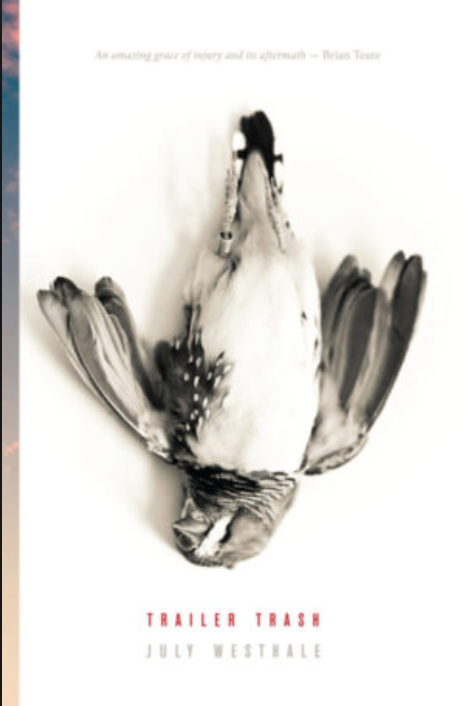ISSN: 1941-4137
POETRY THAT ENACTS THE ARTISTIC AND CREATIVE PURITY OF GLASS
POETRY THAT ENACTS THE ARTISTIC AND CREATIVE PURITY OF GLASS

Joey Gould has served on the planning committee for the Massachusetts Poetry Festival since 2011. He is now poetry editor & reviewer for Drunk Monkeys, where his poems were previously published. He runs generative poetry workshops for high school students & helps college students in the writing lab at Framingham State University.
January 28, 2019
Edited by Stephanie Kaylor
Edited by Stephanie Kaylor
Review of Trailer Trash by July Westhale

Trailer Trash
July Westhale
Kore Books, 2018
In Written on the Body, Jeanette Winterson writes, “Trust me. I’m telling you stories.” The poems in July Westhale’s Trailer Trash (Kore Books, 2018) tell trustworthy, enthralling stories that, like Winterson’s narrator, exist in earnest, naked, interrogative states of feeling. Westhale’s poems have come to mean much to me as (full disclosure) we’ve become friends and NaPoWriMo collaborators this year, but I admired her book and her poetic versatility beforehand. These poems literally skewer their inhabitants but bestow astonishing thankfulness as well. Trailer Trash grieves an ecstatic lament while singing a love song’s refrains.
Trailer Trash walks a tightrope of precision that allows for subtlety and shock to coexist gracefully, meaningfully, in its poems. On the subtle side, Westhale conjures a cootie catcher/paper boat as extended metaphor for living in, dying in, and attempting to escape from poverty. In other poems, though, the speaker admits to fisting and “fucking/ execution style.” The latter might get a bit tired without the former, but together they build a confessional voice that delights in contrast, using juxtaposition to ground the reader in a real, sometimes lovely, sometimes perilous world.
“Intolerable Objects / Tomato” contrasts a hypothetical “immaculate kitchen window:/ a picture show with a poodle skirt of cumulus” with a story-true “sky/ vermillion in airlessness… The dinner table/ was the color of a beetle trapped in sap.” The gap between the perfect sky of a movie scene and the off-color hues of one’s real-life experiences lies stark upon the page, shown with such crisp imagery. Trailer Trash is easy to “see” and puts such specific images in one’s mind. This precision, which Matt Sutherland calls “weaponized immediacy” in his review of Trailer Trash, allows me to imagine keenly the settings and events of a long tragic grief mitigated by small mercies.
Yes, mercies. Westhale’s “dead mom” poems, three of which are entitled — wait for it! — “Dead Mom”, do not simply salt the wound. One of the poems starts with a mouth opening; another with thanks for a kindness. This resonates with the messiness of my memories of hard times — how grace arrives, unexpected yet necessary. How the needful mourner cobbles together a vigil out of meager semiosis. How looking back can sear and comfort at the same time. Moreover, there’s a sense of ownership and acceptance of one’s past, which many call the final stage of grieving. Therefor, these poems do not wallow in sadness, but manage to transcend it. Trailer Trash is a manual for overcoming hardship.
It’s a labyrinth clew. A guide to the maze of the heart. Reading this book helped me better understand my own moments of tragedy, yearning, and love. It’s a book I screenshotted for friends & lent to coworkers. The soaring flight of this book is honest and real, so expect to encounter a sometimes brutal veracity. Westhale doesn’t mince words and has the good sense to put aside poetic pretension when a line needs straightfowardness. That doesn’t mean there aren’t beautiful turns of phrase, for surely there are. Rather, Trailer Trash’s poetics do not leave the striking line alone without meaning. Everything in Trailer Trash is purposeful. Every poem in this book helps.
I believe in and recommend this book as a feminist, as a poet, as someone who has grieved, and as someone who has lived in an awkward community they long to escape.
Visit July Westhale's Website
Visit Kore Books' Website
Glass: A Journal of Poetry is published monthly by Glass Poetry Press.
All contents © the author.
All contents © the author.





